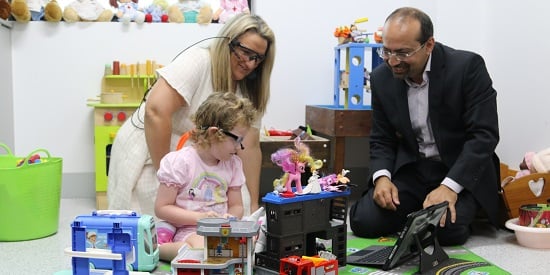Know jab, now play: Study tests best way to support child vaccination
Media release
Geelong and Surf Coast children are needed for a study to determine how play therapy can help kids cope with routine medical procedures, such as immunisation.
The Deakin University research will use special eye-tracking technology, developed by the Institute for Intelligent Systems Research and Innovation (IISRI), to assess how children react to a routine vaccination.
The study will provide first-of-its kind scientific data to build better understanding across two important, and related, areas.
- Children's fear and coping response to vaccination.
- How play therapy can help children better prepare for, and recover from, confronting medical procedures.
Lead researcher Belinda Dean, a PhD candidate in the play therapy team at Deakin's School of Health and Social Development, said children today were the most vaccinated population in history.
"All children respond to immunisation differently, these different responses are important to understanding whether play-based therapy can make a difference," Dean said.
"We want to prevent fear around vaccinations because it can have long-term impacts. We need children to feel comfortable seeking medical treatment when they need it."
That's where Dean, who has a background in nursing, believes play therapy can help.
Using play therapy in children's medical appointments
As part of the research trial at Torquay Medical Hub, children between three and six who are scheduled for their four-year-old vaccine or require a flu or travel vaccine will wear iPupilX glasses, special eye-tracking technology developed at Deakin.
The easy to wear, non-intrusive technology will assess the child's neurobehavioral response during the vaccination, through eye movement including changes in the pupil. Each child will also take part in a play therapy session before and after the procedure.
"Other studies have shown that the more play-based preparation that children are able to participate in the better we can help them through potentially scary medical procedures," Dean said.
"Ultimately, we could train nurses, and other health workers, in how to use medical play-based skills. To help them build rapport with children and assess what they might need. It's important to impart these skills across the medical and health profession."
While this study is looking at vaccinations specifically, Dean and the research team, including principal supervisor Associate Professor Judi Parson, believe the results could be applied across healthcare more generally.
"Play is children's language. It is an important way to help children feel prepared for medical procedures, which in turn helps them feel more calm and less anxious, no matter the procedure," Dean said.
An impactful application of Deakin's iPupilX technology
Lead developer of the tracking technology used in the study, IISRI Professor Asim Bhatti said he hoped that using the iPupilX would bring in some important scientific data to bolster the case for play therapy and its benefits.
"Prior to this, the practice in evaluating a response has been questionnaires, which can be biased," Professor Bhatti said.
"This technology allows us to have more objective findings. It can tell us a variety of cognitive stories that are hard to capture through a questionnaire."
IISRI's iPupilX is a wearable eye-tracking device that uses the information generated through changes in the wearer’s pupil to monitor attention and focus levels. Initially, the technology tracked performance in industries such as defence and manufacturing. But more recently, it has been used to examine children's interaction with harmful products like junk food, alcohol and cigarettes.
This technology has a unique advantage; it can be worn during normal activities and routines, allowing researchers to gather data anywhere and anytime - making it perfect for the study of children.
For more information about participating in the trial please email Belinda Dean at bjmc@deakin.edu.au or fill out a registration form online.

